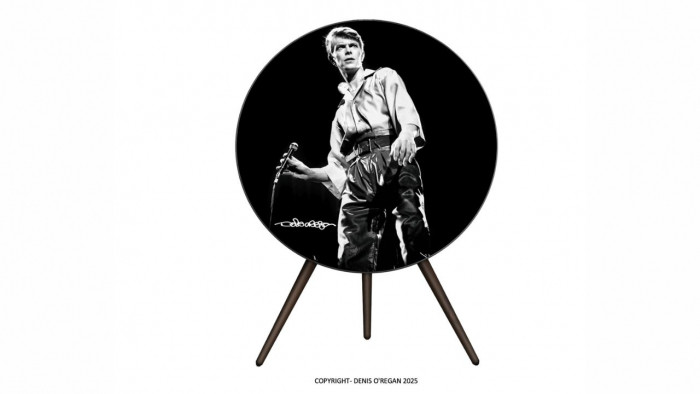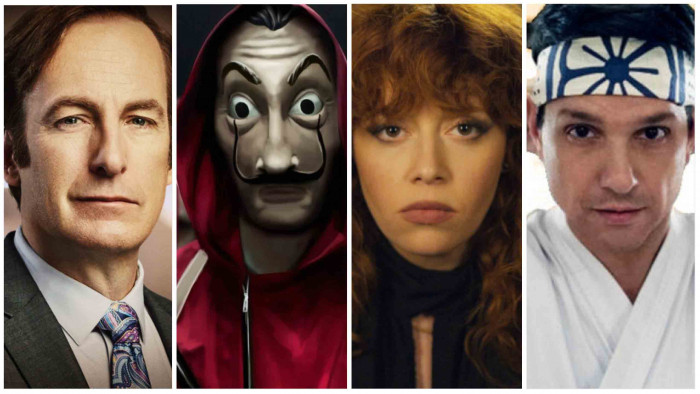Why does nobody talk about 'Battlestar Galactica' any more?
It was so, so good, and it's been all but forgotten


Battlestar Galactica was so, so good. It was a fiercely intelligent, incredibly exciting, appointment-viewing show for the whole five years of its run from 2004 to 2009.
Proper edge-of-the-seat, how-will-I-make-it-to-next-week-not-knowing-what-happens kind of stuff. Everything that prestige TV gets praised to the heavens for, BSG did. But nobody talks about it in the same way we discuss things like Game Of Thrones or Mad Men.
Created by Star Trek veteran Ronald D. Moore and David Eick, the show was an updated re-imagining of the cheesy 1970s original. The older show’s wacky character names were retained as call-signs and the whole mythology was re-thought. The rebooted premise was fairly simple: Cylons, an android race created by humans, attack the human’s home planet of Caprica and kill the majority of humanity, leaving only those in spaceships alive to band together and try to find a new home. However, among them are some undercover Cylons, so far undercover that their artificial intelligence tells them they’re human…

It was the kind of show where a beloved character might, out of nowhere, be shot through the head, or a huge plot twist would arrive mid-episode and change everything we thought we knew.
Stephen King was a fan. George R.R. Martin was a fan. The constantly shifting moral high ground, endless layers of grey and flawed, human characters were as rich as anything on Mad Men or The Wire. Gaius Baltar was easily as compelling an antihero as Walter White, and had better hair. The show even had anti-stupid guarantees in place ensuring it couldn’t be retooled into something silly if it didn’t do well, like had happened to SeaQuest DSV, for instance, a show that humiliated star Roy Scheider into battling fire-breathing worms. Star Edward James Olmos had it written into his contract that if the show ever incorporated aliens, he would leave. He would film one final scene, of his character lying dead on the ground, and the showrunners would have to write their way round it.
Olmos featured in one of the show’s greatest moments, arguably one of the greatest moments any TV show has ever managed: the Pegasus rescue. Look at the f*cking dignity of the man.
Incredible. He was magnificent on that show, tough and vulnerable and romantic. But it just never gets mentioned any more. Think of how often The Wire or The Sopranos are mentioned, or how shows like The X-Files and Buffy the Vampire Slayer have permanently entered the cultural lexicon. BSG feels all but forgotten, with reasonably obscure musician Balam Acab’s use of an image from it as a mixtape cover being a notable exception.
Why?
Here’s why!

The world has gone mad in a whole new way
When BSG aired, the second Iraq War was in full force. Straight away, the show’s storylines acted as an allegory for what was going on – there were sleeper agents, split loyalties, families being torn apart, ideologies crashing into one another and all sorts. The way human characters could justify the torture and mistreatment of Cylons (known disparagingly as “toasters”) clearly echoed what was happening in the real world, where waterboarding was suddenly seen as a legitimate way to seek information.
“One of the show’s main themes, which was pretty edgy in an immediate post-9/11 world, was the idea that one man’s freedom fighter was another’s terrorist,” says writer and BSG superfan Joe. “That felt incredibly relevant in the Noughties, but the world has changed. This decade has been more about the rise of f*cked totalitarian governments, which is why sci-fi like The Handmaid’s Tale and Westworld now feels more relevant.”

You can swear on telly now
The Syfy network, which BSG aired on, wasn’t one of the ones you could swear or show nudity on. One of the ways the show got around the cursing thing was with the fictional swearword “frak” (originally used in the 1978 series), which works exactly the same as the more familiar word “f*ck”. It meant they could get away with a bit more, and didn’t have to have people saying anaemic things like “oh, crap” while bleeding to death, but at the same time, it takes you out of the moment a little bit. “Frack off!” is just not right – Red Dwarf gets a lot of comedic mileage out of “smeg”, but nobody’s writing an article claiming Red Dwarf was as good as The Wire, you know?

It’s too easily dismissable as silly
Say “The Wire”. Now say “The Sopranos”. Now say “Game of Thrones”. Now say “Battlestar Galactica”. Only one of those makes you sound like you’re pushing your glasses up your nose as you speak.
So many genre shows are aggressively marketed as being “x for people who don’t like x”, but this was unapologetically sci-fi for people who really like sci-fi, complete with all the trappings of the genre: sci-fi vehicles, sci-fi ideas, sci-fi uniforms, sci-fi words.
There has probably never been a show more easily dismissed as “stupid nerdy virgin shit” and mentally grouped together with those endless Stargate spin-offs that ran every Saturday morning for 25 years. And the fake swearing and little stylistic touches (like every bit of paper ever seen on-screen having the corners cut off to make it into an octagon) just added fuel to that: “Ooh, your programme is too clever for rectangles, is it? Bet you have loads of sex.”

There were occasional stinkers
There are at least two episodes of BSG that are full-on terrible – possibly partially due to the Writers’ Strike affecting the whole TV world, but possibly just due to a few bad ideas being taken too far. There’s an episode set in a black market that guest-stars the great Bill Duke (of Predator fame) and completely sucks, and one set on a holiday planet that, given the post-apocalyptic nature of the show, doesn’t make any f*cking sense. Because we live in a hideous and unfair world, any time you tried introducing it to someone else, it would invariably end up being one of the shitty episodes. “So, you think this good, do you?” they would say. “It isn’t, it is stupid. You are stupid. You like stupid, you stupid.”

The bad ending took away from everything that came before it
If by any chance the makers of Game Of Thrones are reading this, (1) don’t kill off Tormund Giantsbane, (2) you really need to stick the ending.
Battlestar Galactica’s ending was not good – the show had painted itself into a few corners, and the Writers’ Strike didn’t help anything, and it all went a bit “God Is Love” at the very end (a bit like the first time The X-Files ended, which was f*cking craaap). “Looks like somebody skipped Writing 101, when you learn that a deus ex machina is a crappy way to end a story” wrote George R.R. Martin. A shit, fan-hurting ending takes massively away from the gold that came before it, and just makes rewatching the series that bit less likely, or any enthusiastic recommendation come with a few too many caveats.

It got, er, out-sexied
There was a lot of bangin’ on BSG, a lot more than audiences were used to expecting from sci-fi shows. The outrageously attractive cast were always at it – the apocalypse that begins the show is essentially caused by Dr Gaius Baltar (James Callis) being rendered so erect by Number Six (Tricia Helfer) that he forgets his essential humanity. One incredible episode had the two of them going at it hammer and tongs while she only existed in his mind – it went from steamy scenes of the pair of them going like the clappers to a third-person perspective of Baltar, pants round his ankles, thrusting into nothing. That’s some good TV. The show often felt really outrageous for telly – all beads of sweat running down bare backs and strategically-placed garments hiding what had to be hidden while leaving you in no doubt that the actors were naked. Now that shows like Westworld and Altered Carbon are genitals-out from the opening credits, though, BSG’s nudity-avoiding sexiness can feel a bit Austin Powers-esque.

Nobody from it has gone on to do that much else…
As a fan of the show, it seemed clear that everyone in it was going to go on to big-screen greatness. They had the talent, the charisma and the good looks to be enormous stars. It just didn’t quite happen though – not in a way that did anything for the legacy of the show anyway.
Most of the cast have continued working in similarly nerd-friendly, mainstream-avoiding fare where they’re huge stars charging $50 for an autograph in convention centres every few months but can happily go to Greggs unbothered. (If you ever want to see an actual stampede, stand outside Forbidden Planet and shout “Oh my God, it’s Katee Sackhoff!”)
The big names within the cast – Edward James Olmos, Mary McDonnell, Lucy Lawless, etc – were already stars, so there isn’t a huge, eternally-visible megastar’s career that keeps reminding everyone of the show the way, say, Jon Hamm does for Mad Men or Chris Pratt does for Parks & Recreation.

…And some of them might have been in a cult
Hmm, yeah. There’s a deeply unpleasant investigation into a Hollywood sex cult going on at the moment. Known as NXIVM, it is alleged to have treated people hideously, selling women into slavery, physically branding them and psychologically abusing them.
The highest-profile person involved is Smallville star Allison Mack, who was arrested at the end of last year, but two BSG alumni are said to be loosely involved as well. Grace Park, who played Sharon “Boomer” Valerii, appeared in videos with NXIVM founder Keith Raniere, and Nicky Clyne (Cally on BSG) is married to Mack.
The case is ongoing but hideously upsetting, and while it’s a few steps removed from the show itself, it’s certainly not going to win BSG any new fans.

It might seem like loads of marks against a show, and that it might even not have been that good, but it was, it really was.
Every great show has a few stinkers (the Columbus episode of The Sopranos), subplots that go nowhere (Marie’s kleptomania on Breaking Bad), embarrassing elements (the wigs in season one of Game Of Thrones are shiiiiiiiiit) or comes with caveats (“Oh, the first twelve hours of The Wire are really boring”), but we forgive them because they’re otherwise so good.
Battlestar Galactica deserves to be mentioned in the same context as shows like that, and is unjustly ignored due mostly to circumstances beyond its control – timeliness, network standards and a million Stargate shows each crapper than the last.
It’s a great show. It’s not just Battlestar Galactica – it’s the Battlestar Galacticest!
(Pics: Syfy/Getty)








